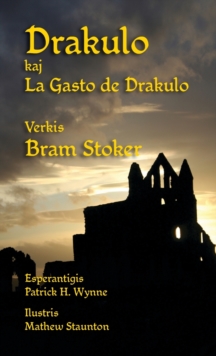Kiam juna solicitoro Jonathan Harker vizitas Transilvanion por helpi al Grafo Drakulo en la aceto de domo en Londono, li eltrovas pli pri sia kliento kaj lia kastelo ol li eble dezirus... La klasika romano Dracula fare de Bram Stoker estas prezentita ci tie en nova Esperanto traduko de Patrick H. Wynne. Dracula estis unue publikigita en 1897, kaj havis profundan influon sur monda literaturo. Gia enorma populareco de post sia publikigo estas sole respondeca por generado de eksterordinara vampira subkulturo en la dua duono de la dudeka jarcento. Pli ol mil romanoj kaj centoj da filmoj roligas Drakulon au aliajn vampirojn, sen mencii la sen-nombrajn desegnofilmojn, komiksojn, kaj televidajn programojn fundamente inspiritajn de ci tiu verko de Stoker. Ci tiu eldono ankau inkludas Esperantan tradukon de la novelo "Dracula's Guest", kies angla originalo estis unue publikigita en 1914 de la vidvino de Stoker, Florence, kiu diris pri la rakonto: "Gi estis origine eltrancita el la romano pro la longeco de la libro, kaj eble montrigos interesa al la multaj legintoj de tio, kion oni konsideras la plej rimarkinda verko de mia edzo." Abraham "Bram" Stoker naskigis en Clontarf, Dublino, la 8-an de novembro 1847, kaj mortis en Londono la 20-an de aprilo 1912. Li estis irlanda verkisto de romanoj kaj noveloj, kiu laboris kiel la per-sona helpanto de aktoro Henry Irving kaj la negoca administranto de la teatro Lyceum en Londono, kiun Irving proprietis. Mathew Staunton estas presarta historiisto de Dublino kaj pro-prietulo de The Onslaught Press. Li produktis la ilustrajojn por ci tiu eldono per sia presilo en Oksfordo. Patrick H. Wynne lernis Esperanton antau kvardek jaroj, kaj estas redaktinta plurajn librojn en Esperanto por Evertype. Iama profesia ilustristo, adepto pri la artlingvoj de J. R. R. Tolkien, kaj katsatanto, li logas en Minesoto.
=====
When estate agent solicitor's clerk Jonathan Harker visits Transylvania to assist Count Dracula with the purchase of his London house, he discovers more about his client and his castle than he might wish.... Bram Stoker's classic novel Dracula, originally titled The Un-Dead, was first published in 1897. It has had a pro-found influence on world literature. It has enjoyed enormous popularity since its publication and is singu-larly responsible for spawning an extraordinary vampire subculture in the second half of the twentieth century. Over a thousand novels and hundreds of films feature Dracula or other vampires, not to mention the countless cartoons, comics, and tele-vision programmes which were ultimately inspired by Stoker's work. This edition includes the short story "Dracula's Guest", which was published in 1914 by Stoker's widow, Florence, who said of the story: "It was originally excised owing to the length of the book, and may prove of interest to the many readers of what is considered my husband's most remarkable work." Abraham "Bram" Stoker was born in Clontarf in Dublin on 8 November 1847 and died in London on 20 April 1912. He was an Irish novelist and short story writer, who worked as the personal assistant of actor Henry Irving and business manager of the Lyceum Theatre in London, which Irving owned. Mathew Staunton is printing historian from Dublin and proprietor of The Onslaught Press. He produced the illustrations for this edition on his press in Oxford. Patrick H. Wynne learned Esperanto forty years ago, and has edited several books in Esperanto for Evertype. A former professional illustrator, adept at J. R. R. Tolkien's constructed languages, and a cat lover, he lives in Minnesota.


